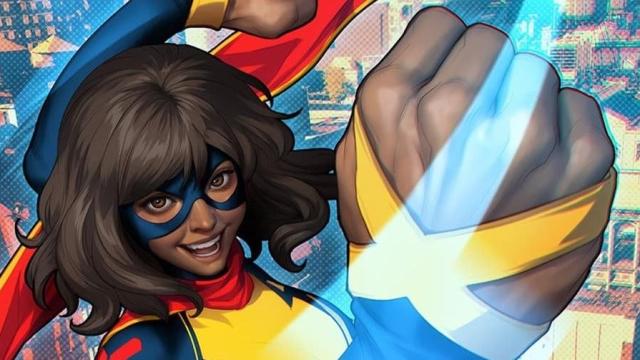The last few months have been quite a time for Kamala Khan and her legions of fans. From her (initially leaked to widespread scorn) fridging and death in Amazing Spider-Man #26, to her resurrection and the not-so-shocking-yet-still-befuddling reveal that she is in fact a Mutant as well as an Inhuman, to the announcement that she will now be a member of the X-Men, it’s been wild, to say the least.
Due to the abruptness of these changes, it’s undoubtedly clear that Marvel Editorial is readjusting Kamala Khan to align with her MCU version, as her Disney+ show’s finale revealed her as a Mutant. Apparently, according to Amazing Spider-Man writer Zeb Wells (who is also a writer on The Marvels) and Spider-Man editor Nick Lowe, the only way this could happen was through her shocking death that wouldn’t even be in her own series, and not even with any of her main supporting cast.
But Kamala has come back as quickly as she was killed off in the comics, with her Krakoa Resurrection just in time for the Hellfire Gala and her new mini-series, Ms. Marvel: New Mutant, written by her MCU actress Iman Vellani and Sabir Pirzada. This makes a first for Kamala, who will now have not one but two Pakistani writers on her series. Pirzada has already showcased himself as an acclaimed writer of Kamala in 2022’s Marvel Voices and Dark Web: Ms. Marvel. While this is Vellani’s first foray into writing comics, she has a wealth of knowledge of Marvel and Ms. Marvel comics, as well as Neil Gaiman’s magnum opus, The Sandman, that will undoubtedly behoove her a comic writer, with hopefully many more stories to come from her as a writer, as well as actress.
However, will these writers be able to salvage what many fans see as a mess that Marvel Editorial has put Kamala into? Nothing previous to the Amazing Spider-Man or Hellfire Gala indicated that she would become a Mutant. She was always simply the most famous of the Inhumans. But now, because of Marvel’s insistence on synergy with the MCU, and the overall plan leading to the X-Men and Mutants, it would appear that now it sees Ms. Marvel as an opportunity to further promote the X-Men as they return, and seem to believe that she needs the boost from the strength of their IP as well. But Ms. Marvel already had her own series and is starring in feature film The Marvels with Captain Marvel and Monica Rambeau, so does she really need another boost?
The circumstances leading to this chance in the comics are highly questionable at best. Ms. Marvel cosplayer Isa Shaw-Abulafia notes the messy optics with Kamala’s death and hasty resurrection. This includes the choice to have Kamala be shapeshifted as Mary Jane when she was killed, after she had previously already made the choice to not shapeshift into other people anymore, and in particular white people after she realized that she didn’t want to. “Kamala, Marvel’s most prominent South Asian character, being killed off in a white male character’s comic to serve his emotional arc, during AAPI month, is already bad enough for the medium that had the term ‘fridging’ coined for its treatment of female characters,” Shaw-Abulafia says. “But that death happening in the circumstance of her having shapeshifted into a white woman—an action which goes against her prior character development in her own comics, makes it feel like that writer didn’t care for Kamala’s identity and history as a character who is such a beloved depiction of many under-represented groups (Muslims, South Asians, and girls from both those groups).”
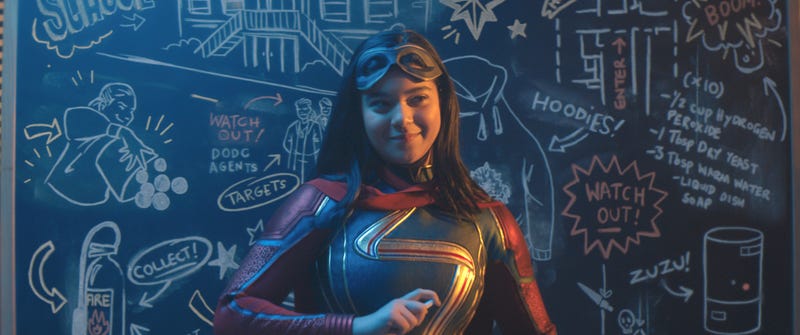
Shaw-Abulafia notes that even though it was “obvious” this was a “comic-book death” that wouldn’t last long, due to the popularity and novelty of the character, that somehow made it worse to watch unfold. “Characters like Kamala are so few and far between,” she says, “that pulling this kind of stunt, in these circumstances, feels incredibly thoughtless.”
The resurrection on Krakoa functioned to make Kamala a part of the X-Men. The hopeful thought for this is that it would bolster her profile to be part of such a famous team. Ms. Marvel cosplayer Jasmin Joestar offers this much more optimistic take, saying that despite the circumstances leading up to this change, it presents a plethora of story possibilities that can enhance Kamala as a character who stands out in the Marvel Universe. “Realistically speaking a character can be both an Inhuman and an X-Men,” she says. “Ms. Marvel being that brings on a new perspective and countless possibilities. This changes the power ranking and redefines what a hero is, could be, and how diverse they are—which Ms. Marvel is a Champion of. I’m excited to see what an Inhuman X-Men is capable of! And I’m happy they chose Ms. Marvel to explore that with.”
It certainly offers interesting story possibilities. Thankfully, Vellani has already said in an interview with Marvel that her mini-series will explore the “psychological effect that a resurrection would have on a 16-year-old kid who has no one to talk to about it,” so readers will see the ramifications of what happened to her. Vellani also says that while Kamala thinks that now being a Mutant is just “another label,” it actually “bear[s] so much more weight than she was expecting.” Additionally, Vellani notes that Kamala will “learn a lot about herself and a lot about the magnitude of discrimination that the mutants are facing.” Clearly, her being a mutant will be largely significant on her character, in Vellani’s mini-series and beyond.
No matter what, Vellani aims to “represent Ms. Marvel in a way that was true to the path paved by G. Willow Wilson and Sana [Amanat],” and “highlight everything that [she] love[s] about this character and about her comics and her ability as a Super Hero.” Even if the changes now are highly abrupt, Vellani and Pirzada seem keen on preserving what Ms. Marvel fans love about Kamala.
But as to the larger question of boosting Ms. Marvel’s profile in the long run, Kamala never really needed the Inhumans, or any other group of characters, to have the spotlight as a character. If anything, it was only Carol Danvers she needed so she could follow the Ms. Marvel mantle, and then crucially realize that she had to distinct herself from to be her own hero. This was especially pertinent during the Civil War II arc, where Kamala became disillusioned with Carol for her Minority Report draconian practice of attempting to prevent crime before it happened.
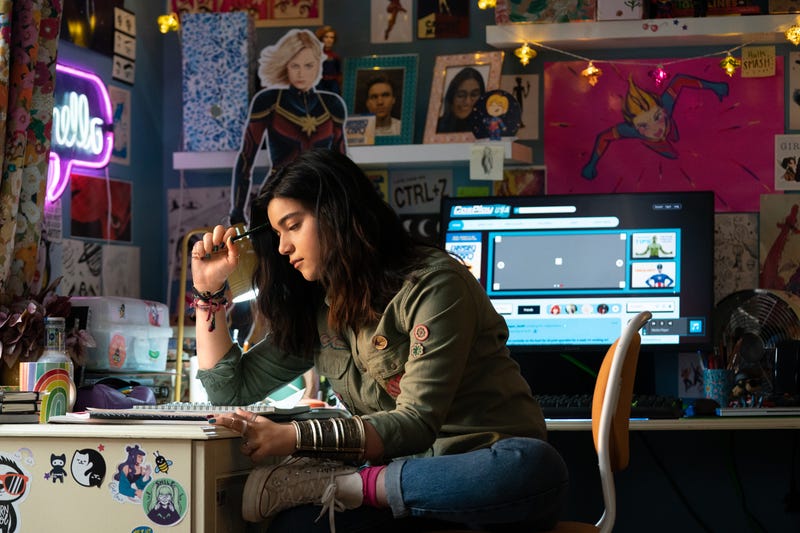
Writer and Ms. Marvel fan Maryam Ahmed reinforces this point about Kamala’s individuality being key to her success. “Ms. Marvel succeeded as a comic because of her uniqueness, as a superhero, a leader, and for being so centered on her family and culture,” she says. “The X-Men comics have an unfortunate history of sidelining their team members of color in favor of making their comics focus on the team as a whole. Part of what made Ms. Marvel such a beloved character was because she got to stand on her own. Bringing her back as a member of the X-Men, so that she aligns with the MCU, seems to take away from her potential as a fleshed-out largely standalone character.”
Ms. Marvel fan Zaid Somji echoes Ahmed’s thoughts, noting that based on the overall track record with the X-Men’s treatment of many of its individual members, many are toned down to fit in with the larger team. “On one hand, I’m grateful that her powers have not changed and that her elasticity abilities were kept,” he says, “But on the other hand, I do think that having her as part of the X-Men diminishes parts of her character, especially when it comes to how Mutants in-universe act and how they are written. It worries me how this situation feels somewhat Synergetic with the live-action universe, and while the original intent was to have Kamala be a Mutant, there were other ways to make this hybrid choice happen.”
We know that Kamala’s Inhuman origin is mainly due to corporate circumstances. Kamala’s co-creator Sana Amanat has been vocal about wanting her to be a Mutant. Due to the Fox Studios (which was later acquired by Disney) ownership of the X-Men and Mutants, Marvel Editorial had a directive that no new Mutant characters be made. Thus, Kamala’s origin was that of an Inhuman who had undergone Terrigenesis.
Many have argued that this straightforward origin worked out in favor of Kamala, allowing her to stand out as the most famous Inhuman and not be overshadowed by being part of a larger team or group. While she had connections with the Inhumans and their Royal Family, she mainly stuck to Jersey City. As part of the Avengers and later the Champions, she had joined teams out of her own sense of heroic duty, and not out of what her power background dictated.
Kamala as part of the X-Men will certainly bring about interesting stories for her, but there were already mysteries and concepts established throughout her runs that lent themselves to more storytelling. In Beyond the Limit by Samira Ahmed, it seemed like Kamala would take more of a multiverse approach, with the revelation that Ms. Marvel not only borrows matter from herself across time to embiggen and change her body, but also across dimensions. Will this be part of what Kamala finds on her journey as a Mutant and X-Person?
It came as a relief to many fans that 616 Kamala retains her normal powerset, despite the changes to a Green Lantern-esque powerset the MCU made. In a 2018 interview with Entertainment Weekly, co-creator and writer G. Willow Wilson noted that she wanted to make Kamala’s powers reflective of the discomfort and weirdness of growing and being in your own body. This was inherent in the text of Ms. Marvel: No Normal, where we read Kamala struggle to adjust and fully accept herself in her own brown skin. Pakistani-British writer Shaheena Uddin notes that by changing her powers in the MCU, this version may have lost something integral to the character.
“I think what I liked most about Kamala’s original shape-shifting powers in the comics is how relevant it is as a metaphor for colorism and identity,” she says. “Kamala initially shapeshifted into [Captain Marvel] because she idolized her, along with the ideal European beauty standards she always thought she wanted to fit in with. Later on in her journey arc she realizes how by trying to be someone else, she’s lost her true self in the process.”
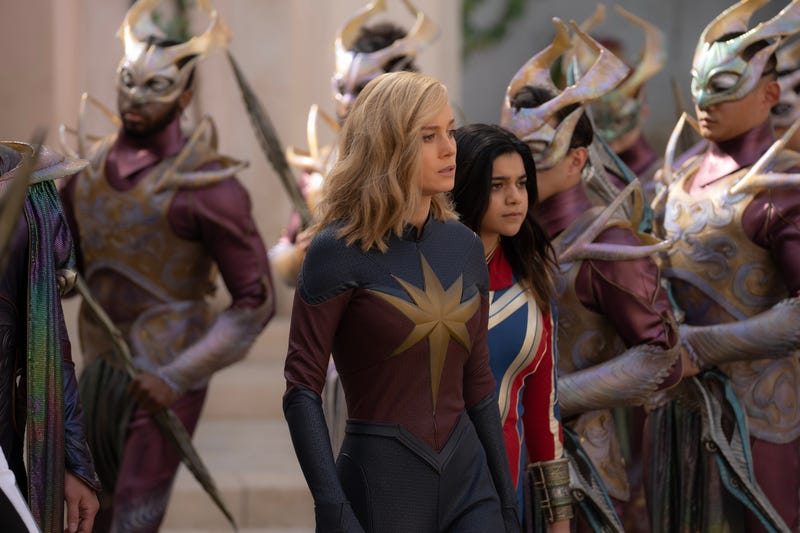
Uddin notes that the experience Kamala undergoes with her powers in No Normal resonated deeply with South Asian audiences. “She learns to become more comfortable in her own skin (literally). I think that’s something a lot of South Asians can relate to. We have to bend and break the existing molds time and time again. I personally think they lost that powerful nuance to her origin story by changing her powers and making her a mutant in the series. Although I did like the bangle because it tied her powers to her cultural roots, it was better that they made her powers come from herself internally (be it as an Inhuman/Mutant) rather than an external force.”
Fellow Ms. Marvel fan Zoha echoes Uddin’s concerns about the changing powers. Although Kamala retains her regular powerset in the comics, a huge relief for many, there is worry about them changing later on, particularly after Professor Xavier told her that her mutation “hadn’t manifested yet” and was suppressed by her Inhuman genes, at least for now. In her concerns, she notes the similarities she has with the character, and how these worries are particularly stinging. “For a long, long time, I identified so closely with the character of Ms. Marvel,” she says. “I couldn’t believe she was actually real. A character who was Pakistani-Muslim, like me, my age, from the same city in the homeland (Karachi), having the same kinds of struggles with trying to balance her identity as a brown girl in a place that obviously didn’t appreciate her. I even look like her, quite a bit—dressed up as her at a few cons, too.”
For Zoha, the polymorph powerset is essential to the character of Ms. Marvel, and a key part of why she is so relatable. She believes that despite the show’s best efforts, some of that relatability has been lost, and she fears that the power change could still extend to the comics with the pace of changes Kamala has had, and particularly with Xaveier’s revelation about her unkown Mutant power. “The light-based powers that they gave Kamala in the MCU, that they might give her NOW in the comics, is possibly the worst outcome I could have imagined,” she says. “Destroying the themes of self-discovery and confidence that were constructed with the shapeshifting powers originally is terrible enough already, but separating her from her beloved team and civilian cast, and flattening her unique power set to make her fit in a bland trio of the MCU The Marvels is just sloppy, sad writing. It kind of feels like spitting in the face of everything that was achieved after Kamala was introduced in 2014, and I don’t see it getting much better than this.”
Of course, it is far too early to say how Kamala will be handled in either the X-Men, The Marvels, or the wider MCU. But seeing as the comics have already taken Kamala out of Jersey City and far away from her supporting cast, the changes are already concerning. One of the many reasons Kamala Khan is so beloved is because she’s very much the “Friendly Neighborhood Ms. Marvel.” She solves local issues and protects her Jersey City community, and often bridges her South Asian and Muslim community with the wider city.
Kamala’s identity is inherent in her storytelling because her communities are so integral to some of her most popular individual stories, such as when she unearths an evil gentrification plot, saves runaway kids from a local villain, and the exploration of the individual impact she’s had on her supporting cast. The question then is, as part of the X-Men, known for sticking mainly together, and dealing with wider-ranging issues outside of Jersey City, will she have the same opportunities to expand on her core avenue of storytelling?
There’s an endless amount for Kamala to still explore, do, and learn about herself in Jersey City, and these changes are taking her out of that, at least for now. While she teamed up with the Avengers, led the Champions, and even worked with the X-Men a few times, she always stood out not only for being the only prominent Muslim and Pakistani character, but for her unique dedication to solving everyday problems as a superhero and making her the hero Jersey City needs. With the transition to Mutanthood and being an X-Men member, will she get to have as many individual adventures as before, including in a still-elusive ongoing series?
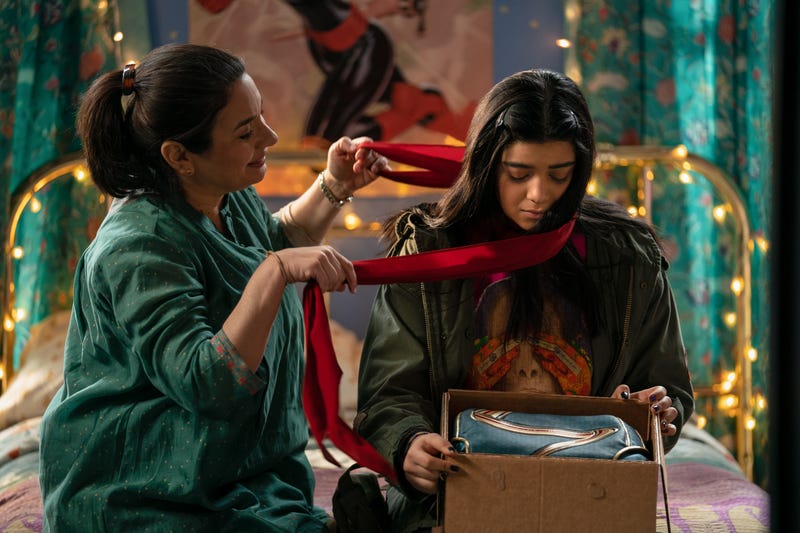
PhD student Meher Shiblee notes that even besides the synergistic practices, making Kamala an X-Men team member this way ultimately feels random, and incongruous with how Kamala found success. She fears that as part of such a famous and large team as the X-Men, these new stories have the potential to diminish Kamala rather than uplift her. “Kamala was a well-established character, with a great origins story, great powers, and a great costume,” Shiblee says. “She has very easily managed to stand on her own two feet, without having to rely on other superhero teams to carry her in her runs, and I think she does not really need to be a part of the X-men to find an audience…Her origin story, where she is an inhuman works. I don’t see why she needs to be a Mutant as well.”
Shiblee also notes that Kamala’s very first moments of introduction to Mutantkind were handled poorly, especially for a teenage Muslim character. “I was quite baffled to see some of the pages from the new comic, where she is depicted in a short, red, lingerie-like bathrobe, which seems unnecessarily sexualized. I would be frustrated with it no matter what female character was drawn in that manner, but the fact that it is supposed to be a young, teenage Muslim woman, is even more annoying.”
The X-Men, with their history of discrimination as mutants, have often been used as stand-ins for other types of marginalized oppression, including racial and religious oppression. Ironically in this regard, the most well-known and prominent Mutants tend to be white and Christian characters, with Storm/Ororo Monroe being the key exception as a highly prominent Black character and Kitty Pryde as a highly prominent Jewish character (albeit also with recent questionable decisions related to her Judaism). Non-white Mutants are often relegated to the background, have their depictions be inconsistent or have dubious story decision-making. Often this is because these characters’ writers, and artists tend to be white men who are inconsiderate of and deigned not to do the work on understanding the backgrounds of these characters.
The Mutant metaphor has resonated with marginalized readers for decades who feel seen by the oppressed Mutants, but has also faced criticism for being this stand-in from marginalized readers. Mutants do not face discrimination for their skin color, religion, or sexuality, but for having powers. Even while Muslims and Mutants may both be viewed as “dangerous” by bigots, the former group faces oppression worldwide simply for their daily cultural practices. The latter is, unfairly of course, viewed as a threat because of their capabilities. These are, at least on face, not comparable struggles due to the sheer lack of religious, cultural, societal, and geopolitical aspects that Muslims of various backgrounds worldwide face.
With Muslim characters like Ms. Marvel, there’s room for powerful commentary that can help address these issues. But Mutants remain their own unique struggle. There can be similarities, but often readers have found that the direct tackling of prejudice in storytelling remains the most impactful strategy. Vellani’s comments indicate that the Mutant prejudice aspect will be a big part for Kamala, and hopefully that won’t overtake the struggles she, like so many still do worldwide, must deal with for being Muslim in the long-run.
Even while other characters, like the Afghan and Muslim Sooraya Qadir, aka “Dust,” have had some efforts put in, they’ve still been at the receiving end of racist depictions and general lack of consideration for her cultural practices, particularly with no Muslim or Afghan writers. Grant Morrison, her creator, and the X-Office made the assumption that her native language was Arabic, when Arabic is spoken by only around one percent of Afghans; the predominant languages of Afghanistan are Dari, Pashto, Uzbek, and a host of other Indo-Iranian and Turkic languages. The very nature of Dust’s powers evokes an offensive stereotype, turning to literal sand to evoke an Orientalist desert when Afghanistan’s geography is a diverse mix of mountains, grasslands, steppes, and tundra. This mix does include deserts, but why did Morrison default to it for Sooraya, so much as to so make her literal power sand?
And this internal bias among the editorial staff may not have improved that much. TikToker Ash Wasson also notes that the way Kamala was drawn in her resurrection is reflective of the creative team present at the X-Office. “Kamala’s resurrection was not handled with the care that other Mutants have gotten in the past,” she says. “And the weird thing is if you go digging you can find the original sketches on R.B. Silva’s page where they chose to keep Kamala in a full robe post her resurrection. This helps shine a light on a large problem with the X-Men currently: the majority of artists and writers that work on these books are white men, who do not and have not taken any consideration into how they depict Mutants of color.”
Wasson’s concern reflects a large problem with the X-Men being used as a stand-in for virtually any oppressed group, as though all of our struggles can be flattened with the metaphor of Mutantkind. This particularly pertains to another Muslim X-Men character, Monet St. Croix, whom, as Madia Mahdia Lynn wrote in an article for Muslim Girl, was written as “Muslim-when-convenient.” Monet was, effectively, a token for North African and Muslim identity, and again, without any Muslim or North African writers for her.
Wasson worries that the inclusion of Kamala, Marvel’s most prominent Muslim and Pakistani character, is now is a “Band-aid” on the X-Men’s issues with racial and religiously diverse members of their roster, which would come at the expense of Kamala’s own character journey. “There are plenty of mutants of color and even Muslim Mutants that the X-office has refused to shed light on for decades now,” she says. “Giving an already proven character like Kamala a new book lets them say that they have diversity in their publishing without actually putting in the effort to shed light on mutants like Dust and Prodigy.”
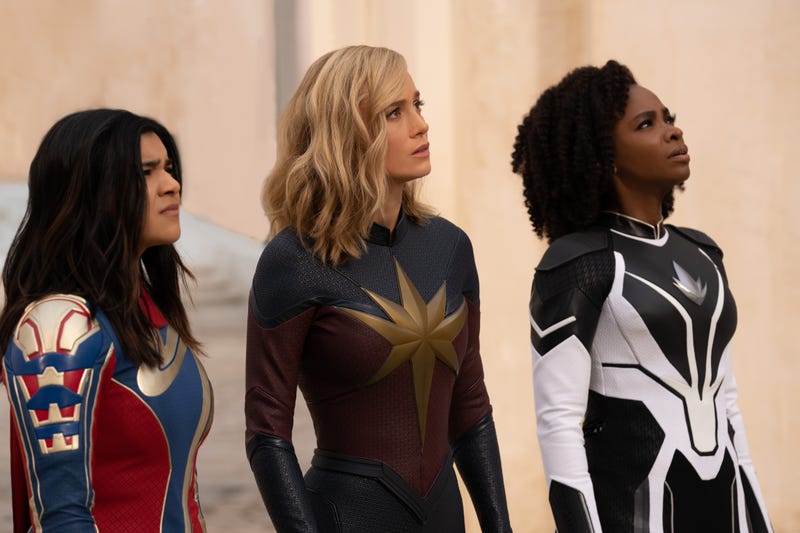
Ultimately, for Wasson, the current editorial decisions for Ms. Marvel are a hurtful step backward, as she fears Marvel will diminish what made Kamala Khan special. “Kamala Khan has always been special to me because she was the first time that I could see myself in comics,” she says. “And for them to trade in what made Kamala special for some half-done mutant metaphor makes me upset. Kamala helped me learn so much about myself as a kid and about my culture and I wanted my nieces to have that same experience with her as they grow up. But now it feels like all the new projects with her are going to be Mutant Projects first and Kamala Projects second.”
While obviously Vellani and Pirzada are the writers for Kamala on this mini-arc, and will help ensure cultural and religious specificity, there are larger questions that remain for how Kamala will be written in X-Men team books, based on the editorial track record with Muslim mutant and mutants of color. It would be advisable for the X-Office to consult writers of these backgrounds for Kamala’s involvement to ensure that previous mistakes don’t happen.
Farah Hernandez echoes Wasson’s concerns, expressing worry that her very costume change, which highlights her new role as an X-person with her regular logo greatly reduced and her trademark family bangle missing. This reflects, as Wasson says, the “Mutant Projects first.” “I adored Ms. Marvel,” Hernandez says, “Seeing that she’s now going to be part of the X-Men, is a stab in the heart to those who known her prior to her death in ASM #26. It’s like she became a different person after that. They gentrified Kamala. She’s now wearing a uniform which is a far cry to her original suit as it has symbolic ties to her culture as a Pakistani Muslim (even her bangle is gone!).” Hopefully, Kamala has her trademark features as a hero back, but it’s hard not to empathize with those who worry about the highly abrupt changes and what they may mean for the character in the long-run.
Anthony Jackson, an X-Men fan who says that he’s “cautiously optimistic,” about Kamala joining the team, also can’t deny the various problems the X-Men have had with Dust/Sooraya. He notes, “There have been some amazing interactions with her character (such as how she handles the deadly nature of her powers or Rockslide turning away when X-23 steals her burka because he knows he isn’t supposed to look at her) but also some very poorly written interactions (such as having her without her burka in House of M, heavily implying that her greatest wish is to not wear it).”
Even the example of her niqab being ripped away shows a level of disrespect for Sooraya’s bodily autonomy, by stealing away a Muslim woman’s chosen garb. She notes as such in a previous issue, saying that it was for “the modesty and protection” it affords her. Whether women want to wear this type of religious garb or do not should only command the upmost respect from others, including those writing them.
Jackson, like other fans, worries about how the X-Office will write Kamala in the long-run. “I think we’re going to get some really great moments out of Kamala’s interaction with the X-Men, but I’m honestly terrified we’re also going to get some really bad and/or insensitive depictions as well (especially after how her death was written).” Surely it won’t be as bad as Sooraya was written, particularly if Muslim and South Asian writers are involved, but the worry remains that within team books without these writers that Kamala won’t have proper consideration for her culture and religion. At the very least, consultants are necessary for whoever is writing her at the X-Office.
Ms. Marvel’s presence with the X-Men could bolster already present Muslim characters like Dust and Monet. With the right writing and artist creative team including Muslim talent like Vellani and Pirzada, it could represent a new Muslim Mutant force going forward. It could showcase better inclusivity and interesting questions about Mutantkind as it pertains to these characters’ faiths and how they consider their Mutanthood in the scope of it. However, that would require steadfast dedication to including marginalized Muslim and SWANASA voices, which the X-Office has routinely not had until this present day with acclaimed Palestinian (and Christian Orthodox) writer Nadia Shammas and now Vellani and Pirzada.
Overall, however, there remains a high level of skepticism among many Ms. Marvel fans who would prefer for her to continue to grow out of the core aspects of her story. It’s not that they want her to simply remain in Jersey City, but to have her individual agency in making decisions on how she will continue to be a hero. It’s not about what she is, but who she is as Kamala Khan: a wonderfully idealistic, kind-hearted, and courageous Muslim girl who fights for everyone she can. In a recent X-Men comic, she claims to her new team “Even if I didn’t have the X-Gene, I would stand with you.” Then why was it so necessary for her to have the X-Gene in the first place?
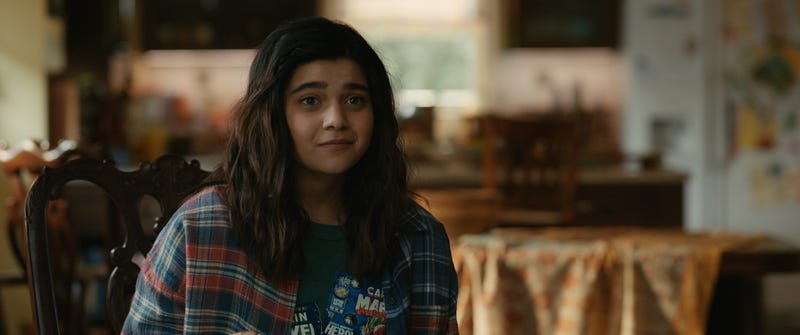
No matter what, Marvel Editorial and its writers should root Ms. Marvel in her community and allow her more opportunities for growth, rather than adhering her to myopic nostalgia by placing her on teams outside her scope. There are of course many opportunities for Kamala to go with the X-Men and to learn more about herself as has a new designation as an “Inhuman-Mutant hybrid.” But these new labels and designations might appeal far more to fan theorizing than interest in her original story and character, as well as vital friends, family, and local community. The fear remains that the focus on who she is could be lost in the sea of nostalgic teams Marvel has chosen to throw her into. I hope this fear is misplaced far away from reality, but the pull to it is great. As the MCU itself has been experiencing recently, synergy and shared universes do not entail automatic success, and characters should be allowed to stand on their own.
It seems, with this abruptly new direction, Marvel Editorial is missing the mark on how to endear audiences to Kamala, focusing more on connecting her to established characters on the screen and page rather than introducing them to her original stories. We will of course have to see how Ms. Marvel pans out as a member of the X-Men, and whether she’ll be able to shine as bright and uniquely as she already has. Yet it’s hard not to miss her Jersey City setting already, and hope she’ll be back there as soon as possible. But with writers like Iman Vellani and Sabir Pirzada who intimately know this character, and in spite of what plans Marvel Editorial may have for her going forward, there’s hope that all her core aspects will remain intact.
Shaw-Abulafia, again: “With Ms. Marvel debuting on the silver screen this year, this should be a time to bolster and celebrate her character in the comics to give viewers unfamiliar with her great comic stories to jump into. Instead, Marvel seems to be altering her to be marginally closer to her cinematic counterpart without any thought for the implications surrounding those storytelling decisions.”
The Marvels hits theaters November 10.
Want more entertainment news? Check out when to expect the latest Marvel, Star Wars, and DC releases, what’s coming to cinemas in Australia this year, and everything streaming this month across all platforms. Check out our dedicated Entertainment tab for more.
